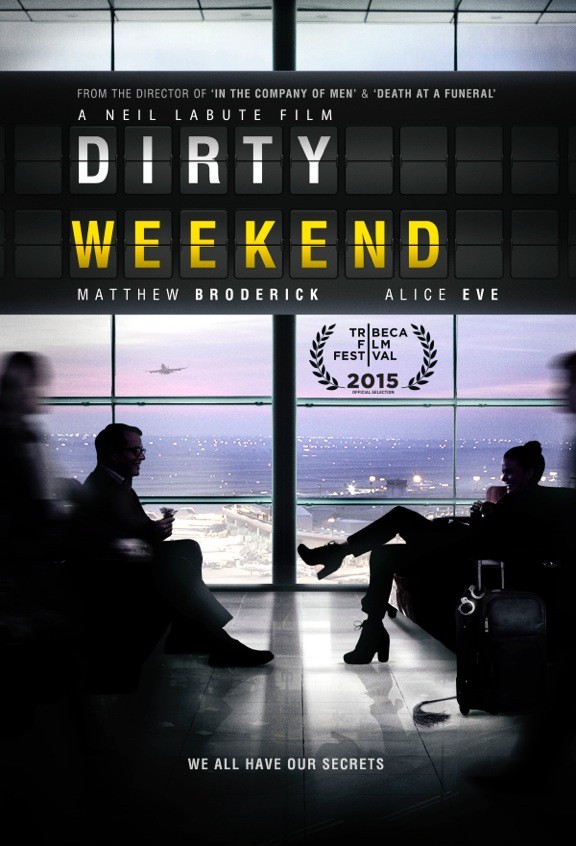
I’ll admit it: I was a little nervous before my chat with Neil LaBute.
I’d seen the writer/director in person at a Q&A a couple of years ago, so I knew he wasn’t super intense or anything like that, but still, he’s the guy behind IN THE COMPANY OF MEN, YOUR FRIENDS AND NEIGHBORS, THE SHAPE OF THINGS, and most recently, SOME VELVET MORNING. He knows his way around a sentence, to say the least, and he's shown no unwillingness to look straight into the darkest depths of the ways human beings treat each other. As curious as I was to dig into the mind of this particular writer, whose work has fascinated me from a fairly young age, I certainly did not want to seem like a buffoon and have him close off to me out of annoyance or boredom...or worse, shut me down.
Luckily, LaBute was as loquacious and erudite as I could’ve hoped. His latest, DIRTY WEEKEND, is about a man-woman work trip that gets held up in Albuquerque, and a perverse curiosity that builds in the man (Matthew Broderick) when he realizes he's had some sort sexual encounter there before (he's drunk and can't remember specifics, even in regards to gender). It's almost solely centered around the two main characters, much like his first film, IN THE COMPANY OF MEN, and gives Broderick and co-star Alice Eve a film's worth of LaBute's juicy dialogue and uncomfortable moments as they traverse the New Mexico city. LaBute was both funny and eloquent while talking about this new work, (which opens today in select cities), why he cast his leads, and his fascination with strained, often implosive romantic relationships:
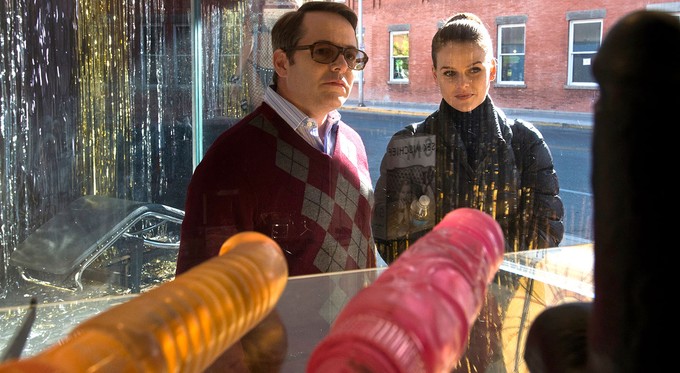
VINYARD: I just want to get started by going all the way back to the beginning. You’ve been writing about sexual politics and the way men and women interact for over 25 years now, and you’re still doing it. I want to know-
LABUTE: (laughs) What’s wrong with me?
VINYARD: More what you’ve seen, and how your sensibilities have developed towards the subject over the past quarter-century?
LABUTE: Well, I think that it remains a very truthful and interesting topic to me. I hope, in some ways, that audiences go along on the journey with me the same way one of my favorite filmmakers, Eric Rohmer for instance, sort of stayed in that world for most of his career. I think I’ve seen all of his films now, and they’ve all sort of fascinated me in different ways.
I think it’s an endlessly fascinating subject because we all go through similar experiences at a certain age. Most of us have loved and lost and hurt someone and been hurt and gone through the gloom of love and things ending or separations or having children and all those things that are relatively universal experience. But there are so many specific ones that people are able to come up with new ones, new versions, new variations of those stories to tell. That’s what I’ve been trying to do, and I still find them interesting.
Even in the case of this particular movie. Something I had not touched on was a story of these two people who weren’t in love, and had no interest in each other in that way, but both were dealing with something in their lives and trying to figure out where they wanted to be as romantic or sexual partners for someone.
VINYARD: Both the characters have homosexual leanings, and it made me think about Jason Patric’s character in YOUR FRIENDS AND NEIGHBORS who’s a repressed homosexual. Has your approach toward that subject changed at all in the 17 or so years since you made that movie?
LABUTE: Certainly anything short of Jason Patric’s monologue in that movie, most people would perceive as progress. That was a pretty scary monologue that he gives, in terms of this moment that happened in his life. It’s me again looking for other ways to approach that topic. In this one, I think in the world right now…in many ways, the film’s kind of old-fashioned, but I think what’s fun about the juxtaposition of that, as old-fashioned as the movie is and as old-fashioned as Matthew Broderick’s character is, I think he’s actually dealing with things that are present in a lot of people’s lives these days, from people who are well on in years or middle-aged to people who are just beginning to face their romantic and sexual selves. A lot of people are finding it okay to explore, and to not put a label on who they are and to say, “This thing that is my sexuality can fluctuate the same way my weight can. Or how the appetite I have for food can grow or recede over the course of a lifetime, that that can actually happen in a sexual way as well.” I think having somebody, or a couple of characters, who are both dealing with that speaks to what a lot of people are going through right now.
VINYARD: Alice Eve’s character is also involved in some sort of BDSM, which I believe is your first time tackling the subject in a movie. Was there anything about that side of sexuality that particularly interested you?
LABUTE: I think there’s definitely a heavy power dynamic that’s at play in that particular world, and I think that thread has often gone through the work that I’ve written. This is just a more overt manifestation of that particular thing, but theatrically I think I’ve touched on it as well. I thought that it was a good variation and very different than what Matthew’s character was going through, so it made for a very viable journey for Alice’s character to be taking.
VINYARD: I’d say that the marriages in your work have been predominantly…troubled, conflicted relationships to say the least.
LABUTE: (laughs) That is a fair assessment.
VINYARD: I was wondering what your personal thoughts were towards marriage. Are you cynical toward the institution, or do you see some kind of hope in the endeavor?
LABUTE: I’m caught somewhere perfectly in the middle. A hopeful realist is probably what I’d call myself, knowing that it’s really hard for people to live together. It’s an admirable pursuit to say that I love someone so much that I want to make this a union that is recorded somewhere and is manifested by these rings and that this is the only person I’ll ever live with.
Are we monogamous creatures? We’ve proved that we can be. Is that the perfect nature for men and women? I’m not the first to say. I’m reacting to what I’ve seen in however many years that I’ve been observant to that, and I know it’s a tough go for a lot of people, and a lot of people are not able to fulfill that commitment. Some never even choose to make that commitment. I’m the last person who’d want to judge someone. The world has tended to create the institution, and then if it hasn’t worked out for someone, then they create a language of failure that goes with it. “You have a failed marriage”, that sorta thing. And I think that’s a hard rap to put on people.
I dig the idea of finding- all those romantic ideas are intoxicatingly great. You know, love at first sight, and finding the one person you want to spend your life with, why wouldn’t those be interesting and really romantic notions? Do they happen to everybody? Certainly not. Is it possible that they actually exist? Sure, why not? If people can believe in all the tenets of religion or democracies or other isms in terms of government, why couldn’t you believe in those things in terms of personal life.
But marriage itself has…I’m not writing science-fiction when I’ve written that a lot of marriages end up being difficult at points. That doesn’t mean that people don’t stay together, or that they don’t find ways to make them better, but a lot of them don’t make it. What they are fraught with is often consequence, drama, and that’s probably why I’ve gone back to that well a number of times, because as writers, that’s what we need. We’re looking for people who are in conflict. Really happy relationships don’t make very good drama, so often, the relationships I’ve written about, whether they’ve been marriages or not, are starting to crack open or are in freefall. Less often, it’s been about the first bloom of love, it’s been about the other side of that. Not because I personally go, “Yeah, love sucks, it doesn’t work out.” It’s that I’m looking to write a story that has conflict in it, so I’m going to create people who are in that place, or are about to be in that place.
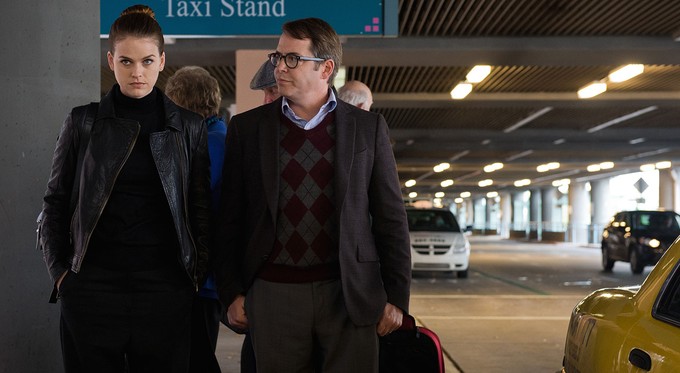
VINYARD: Other than domestic life, your last two films were also two-handers like your first film, IN THE COMPANY OF MEN. Has your approach to making this kinda film changed since ’97 when you shot that first movie?
LABUTE: I’ve probably gotten better at it. You get better at things as you work on them, and I think all these things kind of amassed. I grew up in a very rural and kinda blue-collar world. My father was a truck driver, and we worked on a farm. I sort of approach my work that same way, kinda roll up my sleeves and do my work, and ended up with a good work ethic, I think due to growing up in that atmosphere. And I think I’ve just gotten better at doing what I’m doing the more I’ve written or the more I’ve directed. I probably made that first movie in 11 days, and when I made SOME VELVET MORNING, I beat that record. We made that in eight days.
So I’ve probably gotten more efficient and single-minded about the way I like to make my own movies. I’ve certainly made movies for other people, and those are serious attempts that run the gamut of satisfying to less than satisfying. But when it’s been my own thing, I really like to make controlled environments, and I’m very happy to make a very cost-effective and efficient little movie.
VINYARD: Do you have any interest to return to studio filmmaking?
LABUTE: Depends on the movie. I see lots of things I’m impressed by that somebody else does, and it doesn’t make me want to do it so much as go, “Oh, that was entertaining, that was great.” I’m still more of an audience member than I am an artist. I spend more time going to the movies probably than making movies. I love it when someone makes a good movie that I never would’ve been able to make. There are people who are more proficient, who are better at making a certain kind of movie. To make the right kind of thing for me, to go back to a studio would be great. But I don’t think I’m the first person they would think of for a particular type of movie, so that’s okay with me.
The freedom that comes with making a smaller movie or a smaller TV show or doing theater is a very attractive proposition. To have control over the things that are important to you, the more artistic things that sometimes in a bigger budget would end up becoming economic things, that people are going to worry more economically because there’s more money on the line. I’m less interested in finding myself in that situation.
VINYARD: Over the past few years, you’ve been working on your plays, TV series, and these independent movies. Can you talk about the differences in how you write for each particular medium?
LABUTE: Between myself and somebody else, there’s probably a different sense of variety for a different person. For me, a lot of my characters are very talky, so there’s less difference between my movie and play than there might be between someone else’s movie and their play. I still like that instrument of speech. Most of all, I like good characters talking and interacting in an interesting way, so I think in that way, my films and television and theater remain very similar.
You can’t get around the fact that the visuals you can deal with in film are far superior. Not superior, as much as there’s a bigger sense of variety that affords itself when using a camera, and going from location to location. At an empty space in the theater, it’s amazing what the imagination can do and how much you can take people to places in the simplest of ways in the theater. But there’s also a very different artistry in effect when you’re off making a film.
Television has been a really nice surprise in the last few years because (it came) right about the time I didn’t have anything written and I was starting a new story. I wasn’t really writing sequels or anything like that, so right about the time I started thinking it’d be fun to write more than one story about some of these people was when I got a chance to do television. I was afforded this idea of, “Here, write 10 episodes about these people, or maybe you could end up in a situation where you could end up writing 70 episodes about a group of people.” And that just sounded like a very interesting exercise, and a very interesting challenge. To take a group of people and honestly tell that many different stories about them, as opposed to what I’m used to doing, which is one time, 90 pages, and you move onto somebody else.
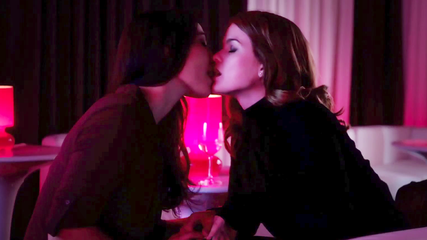
VINYARD: Your last two films also featured Alice Eve. Can you talk about your working relationship with her, and why you decided to use her again?
LABUTE: Because she’s fantastic. When you go back and work with somebody, it’s because you liked something about that experience, and she is really easy to work with, she’s really smart, brings a lot to the table, makes me look good, and adds to the character in a very important way. I had worked with her on stage previously, and then we got a chance to make SOME VELVET MORNING, and after that, very quickly wanted to work on something else. This opportunity came up, and while on paper this was a very different woman, I think that’s what attracted her to it, the idea of playing somebody so different from the character in VELVET. I’m game to see how well she can do it. She jumped on, and really made it her own.
VINYARD: But you didn’t write it for her?
LABUTE: I didn’t, no. I’m not really someone who tends to write for people. I did not write it for her, but very easily saw how she could play the part.
VINYARD: You cast Matthew Broderick in a role that you wouldn’t necessarily associate him with. How’d you land on him?
LABUTE: Well, I liked him because of that whole throwback idea. He’s sort of at the right age right now, he’s around 50. Still boyish, but you’re like, “The guy’s like 50 years old.” i think he brought in a lot of goodwill as an actor. When you first hear his name, you’re like, “Oh, yeah, Matthew Broderick.” Brings a smile to your face because you like something, FERRIS BUELLER and something else usually, for most people. Having him do other things like ELECTION and YOU CAN COUNT ON ME, films like that, I’d seen enough of him doing other work that was more dramatic and interesting.
I thought he would be able to kind of catch the balance of this really well, but he would also be someone you would want to go on that journey with. There’s a guy that’s, again, plain and old-fashioned in his thinking about romance and sexuality and what he’s supposed to do as a man, and yet you could go on the journey without really judging him or feeling funny about it, and I think that might be easier for some people to do when you’re talking about sex. You can go, “Oh, if he can find himself in that place, maybe I’m not so weird to have these thoughts or to want to try this thing.” So that made him very attractive. He had all the right tools as a comic actor and a dramatic actor, but he also felt like the right kind of everyman to take the journey with.
VINYARD: He, like Alice Eve and like Stanley Tucci, has a lot of theater experience.
LABUTE: That’s a very good point. All of them have theater backgrounds. A lot of people I work with have that background because, like I said, these features can get really dialogue-heavy, and so it’s a lot to ask them to do to learn eight or ten pages a day and go off and shoot all that and then say, “Okay, you’re free now, now go off and learn another ten pages for tomorrow.” That can really tax someone if you don’t have that experience of learning and working in those long takes like that. It can be a real challenge for someone who doesn’t have that background.
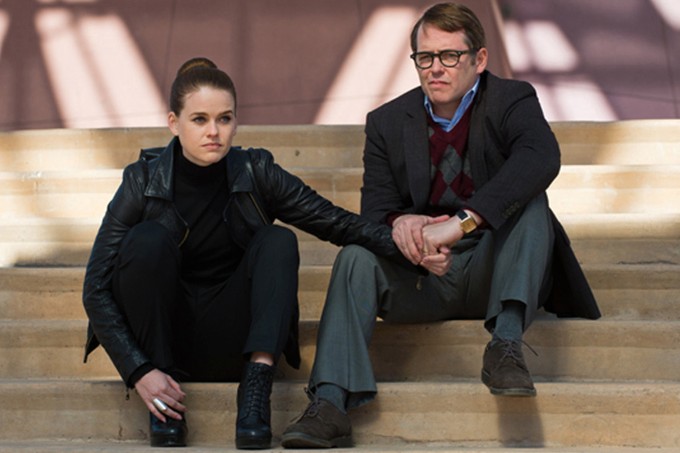
VINYARD: What about Albuquerque? Why the decision to set this there?
LABUTE: Part of it, quite honestly, was the tax breaks, so again, the economics playing into it. The trick has always been, I’ve found, to making a really expensive movie (from) the first time I did one, it to always to make the economic choices look like they’re artistic ones. Out of the states and cities that people were getting good tax breaks, and in that way extending their budgets because people were adding to them because of the rate that they would be getting, Albuquerque made sense to me as a city where you could be flying from another city, like Los Angeles (and end up there).
It’s not that you don’t want to be there, but it’s just like that’s not a destination that you think of as a normal one. It felt like it was a little off the beaten track, and somewhere that we’d implied that he’d been to a conference and gotten drunk and never expected to go back there, and when he did, that opens the rabbit hole and he goes back into it to see what he did when he was drunk and forgot himself.
Albuquerque, also because it’s isolated, it’s very spread out, strange. It’s got a big college, but there’s also a Native American population. It’s just a very interesting group of people, but it’s also surrounded by desert so it feels like this weird, kinda isolated out of the way place, and that’s an interesting backdrop to throw these two city dwellers into.
VINYARD: I think that should be their new city motto, “It’s not that you don’t wanna be there…” My last question: how important is rehearsal time to you?
LABUTE: Rehearsal time is really important, in some ways crucial, to a thing like this, especially if you wanna do long takes and love to shape relationships between actors at the same time so you shoot it in a two-shot, you really need time to work and get to know each other. These characters don’t know each other very well, so luckily we could kind of prey upon that, that Matthew and Alice didn’t really know each other, so you didn’t have to build this false sense of, “Oh, look, they’ve been a married couple for ten years.” There was none of that they had to do, but they really need to get the rhythm and the language down, and to build up a sense of all of us working together.
Always harder to get time in movies, to get people to build in rehearsal time, even as crucial as it is. Most producers just think that’s wasted money, so changing that way of thinking is not the easiest thing to do. The best rehearsal period I ever had was on YOUR FRIENDS AND NEIGHBORS, where we built in a good week or more of rehearsal. I fight for as much as I can get. I try and rehearse as much as I can while people are setting up scenes. I hate to sit around for hours then start running the clock when the actors step on the set, and then start pushing everyone to hurry up. The actors, their performances, are really going to be what the movie lives or dies by. I am a real believer in rehearsal, and trying to give people as much time as I can. It certainly is more limited in film and television than it is in theater.
DIRTY WEEKEND is playing today in select theaters and on VOD.
